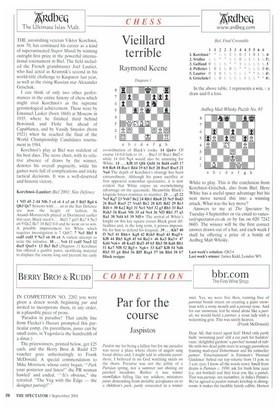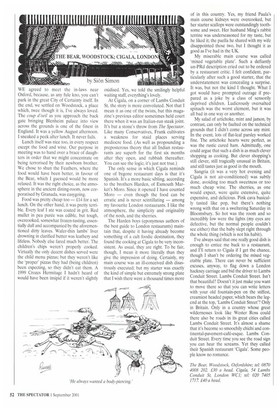Par for the course
Jaspistos
IN COMPETITION NO. 2202 you were given a dozen words beginning par and invited to incorporate them, in any order, in a plausible piece of prose.
'Paradox in paradise!' That catchy line from Flecker's Hassan prompted this particular comp. (In parenthesis, paras can be small coins, in Yugoslavia the hundredth of a dinar.) The prizewinners, printed below, get £25 each, and the Berry Bros & Rudd £25 voucher goes unhesitatingly to Frank McDonald. A special commendation to Mike Morrison, whose entry began, '"Park your posterior and listen!" the PR woman bawled' and ended. '"It's obvious," she retorted. "The Veg with the Edge — the designer parsnip!"' Pardon me for being a killjoy but for me paradise was never a place where choirs of angels sang banal ditties and, I might add in atheistic parenthesis, I believed in no God watching snails on the thorn. Paradise was not the jollity of a Parisian spring, nor a summer sun shining on parched meadows. Rather it was winter snowflakes falling like toy soldiers, miniature paras descending from invisible aeroplanes on to a children's park, partly concealed in a winter mist. Yes, we were five then, running free of parental bonds intent on creating a giant snowman with a stony mouth and a parsnip nose. And for our snowman, lest he stand alone like a pariah, we would build a partner, a stout lady with a welcoming grin. This was surely heaven.
(Frank McDonald)
Dear All, that travel agent lied! Hotel only partly built; 'swimming pool' still a car park for builders' vans; 'delightful gardens' a parched mound of rubble with two dead palm trees in scraggy parenthesis framing mad-eyed Dobermann and his rottweiler partner. 'Entertainment' is Eminem's 'Parental Guidance' belted out top volume from 11 p.m. to 3 a.m. (yes, I know all the words now). Smell from drains is Parisian c. 1930; ask for fresh lime juice (i.e. not bottled) and they treat you like a pariah. That was parsnip, not cucumber. in Julia's Pimm's. We've agreed to pardon tomato ketchup in diningroom: it makes the inedible faintly edible. Hottest
WE agreed to meet the in-laws near Oxford, because, as any fule kno, you can't park in the great City of Certainty itself. In the end, we settled on Woodstock, a place which, twee though it is, I've always loved. The coup d'oeil as you approach the back gate bringing Blenheim palace into view across the grounds is one of the finest in England. It was a yellow August afternoon. I sneaked a peek after lunch. It never fails.
Lunch itself was nice too, in every respect except the food and wine. Our purpose in meeting was to hand over a brace of daughters in order that we might concentrate on being terrorised by their newborn brother. We chose to shun the Feathers, where the food would have been better, in favour of the Bear, which I guessed would be more relaxed. It was the right choice, as the atmosphere in the ancient dining-room, now corporatised by Granada, was easygoing.
Food was pretty cheap too — L14 for a set lunch. On the other hand, it was pretty terrible. Every leaf I ate was coated in grit. Red mullet in pea purée was edible, but tough, overcooked, somewhat frozen-tasting, essentially dull and accompanied by the aforementioned dirty leaves. Wafer-thin lambs' liver drowning in clarified butter was leathery and lifeless. Nobody else fared much better. The children's chips weren't properly cooked. Virtually the only decent dishes served were the child menu pizzas; but they weren't like the 'proper' pizzas they had (being children) been expecting, so they didn't eat them. A 1999 Crozes Hermitage I hadn't heard of would have been insipid if it weren't slightly oxidised. Yes, we told the smilingly helpful waiting staff, everything's lovely.
At Cigala, on a corner of Lambs Conduit St, the story is more convoluted. Not that I mean it as one of the twists, but this magazine's previous editor sometimes held court there when it was an Italian-run steak joint. It's but a stone's throw from The Spectator. Like many Conservatives, Frank cultivates a weakness for staid places serving mediocre food. (As well as propounding a preposterous theory that all Indian restaurants are superb for the first six months after they open, and rubbish thereafter. You can see the logic; it's just not true.) The only sense in which Cigala reminds one of bygone restaurant days is that it's Spanish. It's a more basic sibling, according to the brothers Harden, of Exmouth Market's Moro. Since it opened I have counted Moro — even though the food can be erratic and is never scintillating — among my favourite London restaurants. I like the atmosphere, the simplicity and originality of the nosh, and the sherries.
The Harden boys (eponymous authors of the best guide to London restaurants) maintain that, despite it having already become something of a cult foodie destination, they found the cooking at Cigala to be very inconsistent. As usual, they are right. To be fair, though, I mean it more literally than they give the impression of doing. Certainly, my main course was an ill-conceived dish disastrously executed; but my starter was exactly the kind of simple but extremely strong plate that I wish there were a thousand times more of in this country. Yes, my friend Paula's main course kidneys were overcooked, but her starter scallops were outstandingly toothsome and sweet. Her husband Ming's rabbit terrine was underseasoned for my taste, but he liked it; the paella he shared with my wife disappointed those two, but I thought it as good as I've had in the UK.
My miserable main course was called 'mixed vegetable plate'. Such a defiantly un-PRd description cried out to be ordered by a restaurant critic. I felt confident, particularly after such a good starter, that the understatement was concealing a surprise. It was, but not the kind I thought. What I got would have prompted outrage if prepared as a joke by a class of sensorily deprived children. Ludicrously oversalted spinach was the worst element, but it was all bad in one way or another.
My salad of artichoke, mint and jamon, by contrast, can only be faulted on the technical grounds that I didn't come across any mint. In the event, lots of flat-leaf parsley worked fine. The artichoke hearts were perfect, as was the rustic cured ham. Admittedly, one could argue that such a dish is as much clever shopping as cooking. But clever shopping's still clever, still tragically unusual in Britain, and still tastes just as good in the mouth.
Sangria (it was a very hot evening and Cigala is not air-conditioned) was subtly done, avoiding too much sweetness or too much cheap wine. The sherries, as one would expect, were quite extensive, quite expensive, and delicious. Pink cava basically tasted like pop, but there's nothing wrong with that on a sweltering Saturday in Bloomsbury. So hot was the room and so incredibly low were the lights (my eyes are defective, but the normal people couldn't see either) that the baby slept right through the whole thing (which is not his habit).
I've always said that one really good dish is enough to entice me back to a restaurant, and I'll return to Cigala if I get the chance, though I shan't be ordering the mixed vegetable plate. There can never be sufficient excuses, anyway, to flag down a London hackney carriage and bid the driver to Lambs Conduit Street. Lambs Conduit Street. Isn't that beautiful? Doesn't it just make you want to move there so that you can write letters with your old fountain-pen on the stiffest, creamiest headed paper, which bears the legend at the top, 'Lambs Conduit Street'? Only in Britain. Only in a country whose great wildernesses look like Wester Ross could there also be roads in its great cities called Lambs Conduit Street. It's almost a shame that it's become so smoochily chichi and continental-pavement-café-esque. Lambs Conduit Street. Every time you see the road sign you can hear the screams. Yet they called their Spanish restaurant `Cigala'. Some people know no romance.
The Bear, Woodstock, Oxfordshire; tek 0870 4008 202. £30 a head. Cigala, 54 Lambs Conduit St, London WC1; tel: 020 7405 1717. £40a head,



























































 Previous page
Previous page